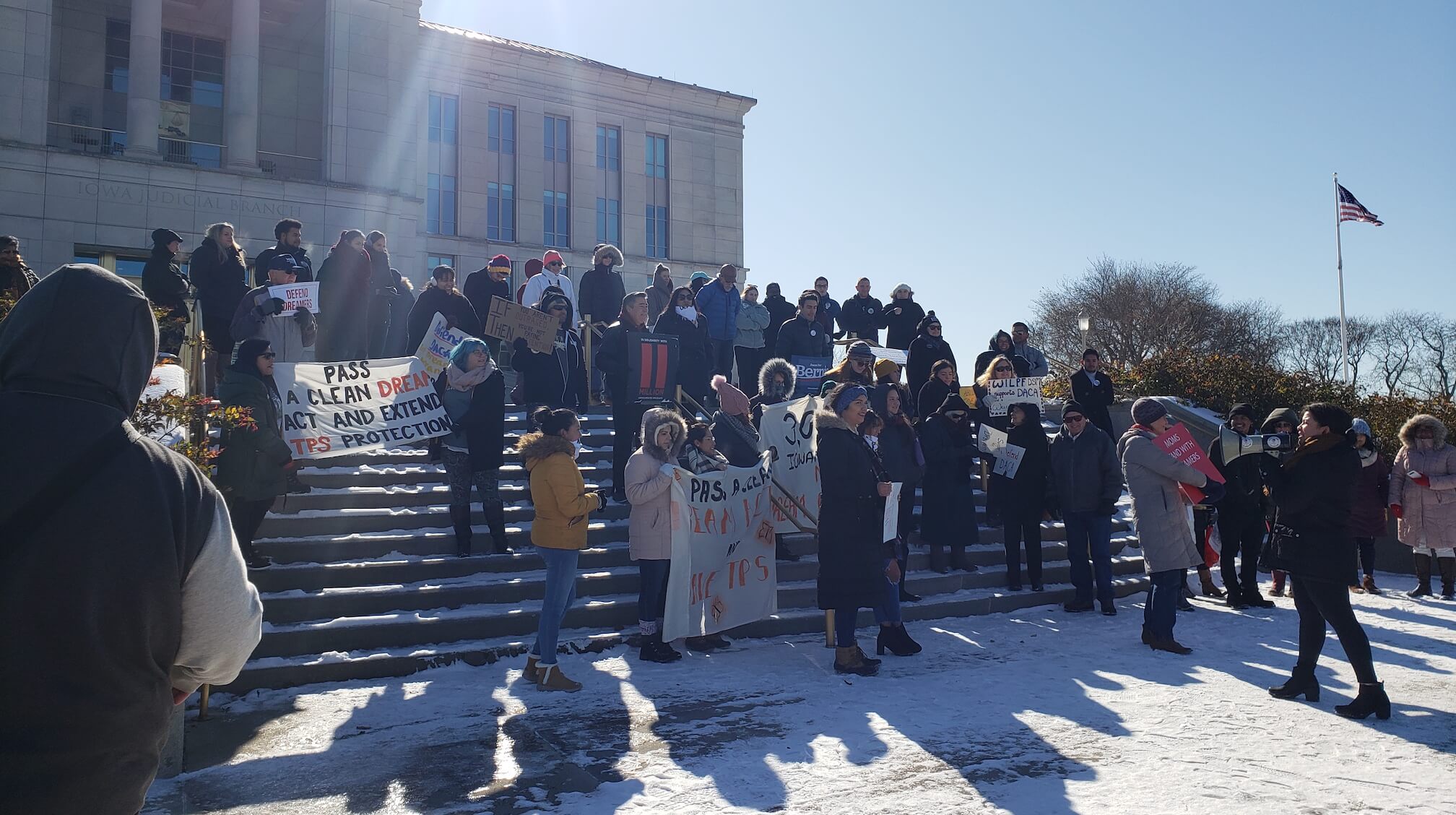
Photo: DACA rally outside Iowa Supreme Court on Tuesday.
On Tuesday, the Supreme Court heard oral arguments about an Obama-era immigration program currently protecting young undocumented immigrants.
At the same time, demonstrators with the Iowa Dream Coalition assembled on the steps of the Iowa Supreme Court with signs and chants about protecting the Deferred Action for Childhood Arrivals [DACA] program and the people within it. Protesters also called for justice for immigrants between now and the Supreme Court’s ruling next summer.
There, the personal side of the DACA conversation came to light.
DACA protects undocumented immigrants from deportation who were brought to the United States as children. It also allows recipients to obtain a driver’s license, find a job and go to school.
The Demonstration
Jessica Hernandez and Karla Garcia are two DACA recipients who attended the demonstration. Their parents came to the United States from Mexico when they were seven and 11, respectively.
“We’re tired of being in limbo,” Garcia said.
Because it was implemented by executive order, DACA has never been a permanent solution. Every two years, recipients have to reapply to the program, and it doesn’t offer a pathway to citizenship for them or the family who brought them to the U.S.
[inline-ad id=”1″]
Garcia emphasized that part of the problem, too.
“We’re tired of [our parents] being treated like puppets,” she said.
Much of the rhetoric at the demonstration was about calling on members of Congress and allies to advocate for DACA and undocumented immigrants.
“As DACA recipients, there’s not much we ourselves can do besides just wait and keep on educating others and keep on trying to get those allies to support our efforts,” Hernandez said.
Hernandez has been in the United States for 20 years, Garcia for 15.
Demonstrators also demanded more from Democratic candidates and asked them to educate themselves about the program and plight of undocumented people in the country.
[inline-ad id=”2″]
The Case
While DACA recipients and their allies chanted on the Iowa Supreme Court steps, the U.S. Supreme Court heard arguments about whether the program should end.
The Trump Administration’s argument is that DACA is unlawful, and even if it isn’t, the government still has the authority to end the program because it was never meant to be permanent.
In the past, Trump has supported DACA recipients and promised not to deport them. But over the past two years, his tone has changed.
The liberal justices on the bench questioned the administration’s motives for ending the program and focused on the number of lives that would be disrupted. The conservative justices largely accepted the administration’s reasoning, though they acknowledged DACA recipients had a lot to lose.
According to 2018 government data, about 703,000 people are DACA recipients. If the program ended, they would be at risk of losing their legal status in the country.
[inline-ad id=”0″]
The Consequences
“If the program ends and there’s no pathway to citizenship, we lose our jobs, we most likely also lose our education opportunities,” Hernandez said. “And then we have the possibility of being sent back to our home countries. And we go back to a country we haven’t seen in at least 20 years. For some, even longer.”
Garcia said she wouldn’t stay in America to find out.
“I know that if nothing happens and they don’t solve anything, I’ll just move somewhere else, either back to Mexico or even Europe,” she said.
Hernandez agreed.
“You just have to emigrate,” she said. “You know, we’re immigrants, so you move wherever the opportunity is given and wherever you’re welcomed.”
Chief Justice John G. Roberts Jr. raised that point yesterday. He implied the administration would be within its rights to end the program, but that there was a humane way to do it that wouldn’t throw people’s lives into chaos.
Whatever the Supreme Court decides, the country won’t know until next summer.
The Ultimate Goal
For many DACA recipients, simply maintaining the program isn’t enough. Demonstrators at the Iowa Supreme Court called for a permanent, long-term solution for immigrants who have lived most of their lives in America.
Hernandez said citizenship is her ultimate goal, something DACA recipients don’t have access to.
“It’s not just about what’ll get us the residency or just a permanent green card, because even that is just a temporary solution,” she said. “Citizenship is essentially what we’re striving for. And not just for ourselves, but for our parents. Because we’re not even talking extended family members, we’re just talking about parents and the people that, yes, made the decision to bring us here, but for a better life.”
By Nikoel Hytrek
Posted 11/13/19
Politics

Biden marks Earth Day by announcing $7 billion in solar grants
The Biden administration on Monday announced the recipients of its Solar For All Program, a $7 billion climate program that aims to lower energy...

6 terrifying things that could happen if the Comstock Act is used to target abortion
Does 1873 sound like a really, really long time ago? Well, that’s because it is—but if Republicans and far-right anti-abortion activists have their...
Local News

No more Kum & Go? New owner Maverik of Utah retiring famous brand
Will Kum & Go have come and gone by next year? One new report claims that's the plan by the store's new owners. The Iowa-based convenience store...

Here’s a recap of the biggest headlines Iowa celebs made In 2023
For these famous Iowans, 2023 was a year of controversy, career highlights, and full-circle moments. Here’s how 2023 went for the following Iowans:...





